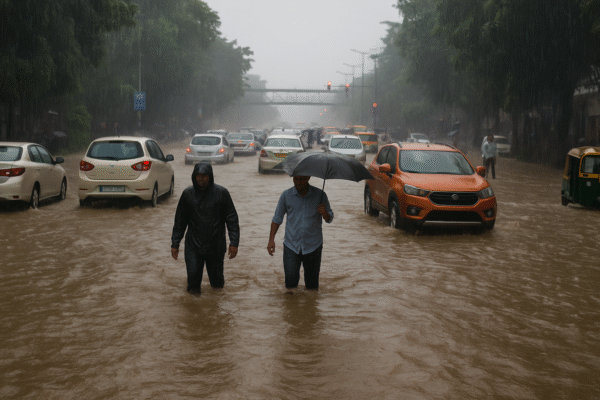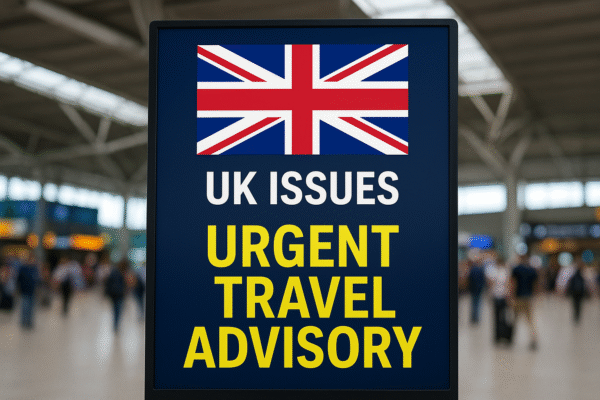The UK Foreign, Commonwealth & Development Office (FCDO) has released new urgent travel advisories for Greece, Germany, and Hungary ahead of the autumn and winter travel season. This move comes amid growing concerns about Schengen entry requirements, increased wildfire risks in Greece, and heightened security threats in Germany. The advisory provides UK citizens with essential updates on safety, emergency preparedness, and upcoming visa system changes that could affect travel plans.
As millions prepare for autumn trips to Europe, the advisory underscores the importance of understanding both environmental and security challenges, ensuring travelers remain safe while navigating updated border regulations.
Greece: Wildfire Dangers and Travel Preparedness
Greece remains a beloved destination for UK tourists, especially during the shoulder seasons of autumn. However, the country continues to face recurring wildfire threats, particularly from April through October. Wildfires, often fueled by hot, dry conditions, pose a serious danger to both residents and visitors.
Safety Measures for Tourists
Travelers are strongly advised to:
- Register for mobile emergency alerts to receive wildfire warnings.
- Properly extinguish cigarettes and avoid leaving litter that can spark fires.
- Refrain from using barbecues or open flames in dry, high-risk areas.
Greek authorities treat accidental fire-starting as a criminal offense. Tourists should immediately call 112, the national emergency number, if they spot a fire or are in danger.
Entry Requirements and Schengen Rules
UK nationals can enter Greece visa-free for up to 90 days in a 180-day period. However, passports must be issued within the last 10 years and remain valid for three months beyond departure from the Schengen area.
Beginning October 2025, the European Union’s Entry/Exit System (EES) will launch. This digital border control system will require biometric data, including fingerprints and photographs, for all non-EU travelers entering or leaving Schengen countries, including Greece. Tourists should prepare for longer waits at airports and border points.
Germany: Security Concerns and Personal Safety
Germany is a hub for business, cultural tourism, and city breaks, but the FCDO has flagged increased risks related to terrorism and crime.
Security Threats
Public spaces remain vulnerable to potential terrorist attacks. Areas of concern include:
- Markets and shopping centers
- Sporting and cultural events
- Places of worship, particularly synagogues
- Restaurants and entertainment districts
Travelers are urged to remain vigilant, follow local safety instructions, and know how to respond in the unlikely event of an attack.
Crime Risks
Germany’s crime levels are comparable to those in the UK, though incidents of pickpocketing, bag-snatching, and scams are more common in busy urban centers. Travelers should exercise caution in crowded places such as airports, railway stations, and tourist attractions.
Entry Rules and Visa-Free Stays
Like Greece, Germany allows UK citizens to stay for up to 90 days within a 180-day window without a visa. Longer stays require a residence permit or national visa application. With the EES rollout in October 2025, border checks will become stricter, with biometric data collection standard for all travelers.
Hungary: Safety and Political Context
Hungary, a rising destination in Central Europe, remains relatively safe for visitors, though political tensions and occasional protests in major cities may disrupt travel. While the terrorism threat is considered lower compared to other European nations, tourists should stay cautious in busy areas.
Entry Requirements
Hungary applies the same Schengen rules as Greece and Germany. UK travelers must hold a passport issued within the past decade and valid for at least three months beyond their departure date. Visa-free entry allows up to 90 days of travel within a 180-day period. Extended stays require national permits or visas. From October 2025, biometric checks will also be enforced at Hungarian border crossings.
Travel Insurance: An Essential Safeguard
The FCDO strongly advises UK travelers to purchase comprehensive travel insurance before departure. The policy should include:
- Emergency medical care and repatriation
- Protection against cancellations, delays, and natural disasters such as wildfires
- Coverage for planned activities, including sports, hiking, or cultural tours
Insurance provides critical protection, particularly in regions facing unpredictable risks like natural disasters or sudden security alerts.
Preparing for Autumn and Winter Travel
The updated UK advisory highlights the need for travelers to plan carefully before visiting Greece, Germany, or Hungary. The upcoming changes to Schengen border controls, wildfire risks in southern Europe, and ongoing security concerns in central Europe underline the importance of staying informed.
By ensuring travel documents meet Schengen requirements, purchasing reliable travel insurance, and following local safety advice, UK citizens can continue to enjoy memorable and safe experiences across Europe this autumn and winter.
For more travel news like this, keep reading Global Travel Wire
















